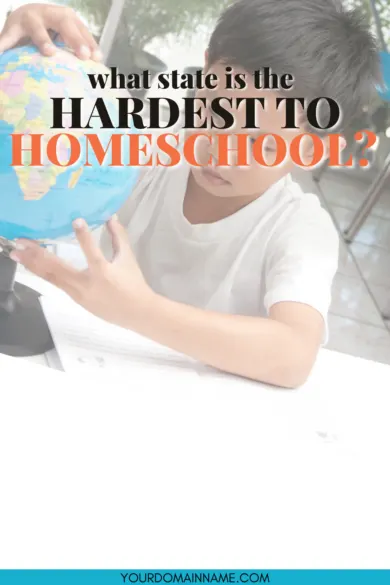Homeschooling is growing at a fast rate in the US, with more than 5 million children being schooled at home instead of being put in a public or private schooling system. You can homeschool a child in any of the 50 states in the US. In some states, it’s an easier process than in others. So, what state is the hardest to homeschool?
The Home School Legal Defense Association (HSLDA) rates the following states as the hardest to homeschool in due to their high regulations; New York, Pennsylvania, Vermont, Massachusetts, Rhode Island, and North Dakota. These states are known to have the strictest regulations in the US.
To highlight the difference in regulations between states, we only have to look at the states where no standardized testing is required, such as Oklahoma, versus the inconvenient state laws of New York. Homeschooling in New York requires annual standardized testing, a detailed individualized home instruction plan, and quarterly performance reports.
What State Is The Hardest To Homeschool?
Homeschooling legal requirements aren’t the same in all states. The decision to homeschool your children, and the process to do so, will be deemed harder in some states where local school districts impose regulations over and above normal legislation.
Many states in the US have hardhanded regulations and prejudicial policies in place, which makes homeschooling hard on parents that want their children to benefit from a unique learning environment that caters to their specific needs.
According to the Home School Legal Defense Association (HSLDA), an organization that protects the rights of homeschooling families, the following states are the hardest to homeschool due to high regulations:
- New York
- Pennsylvania
- Vermont
- Massachusetts
- Rhode Island
- North Dakota
Homeschooling In The State Of New York Is Hard
The number of children that are homeschooled in New York has risen to approximately 54,000 homeschoolers. The pandemic forced parents to get creative regarding their children’s education; for most, the obvious and most beneficial solution was permanent homeschooling. So, why is it hard to homeschool in New York?
The New York Education Department demands a lot from parents and students dissatisfied with the public schooling system. To meet requirements, homeschooling parents in New York have to be on top of the following:
- Provide annual written notice to the superintendent of schools of the intent to homeschool their child (by July 1st)
- Provide a detailed individualized home instruction plan (IHIP) which must include curriculum materials, textbooks, a list of syllabi, and a plan of instruction to be implemented in each of the listed required subjects (must be completed in 4 weeks) to be reviewed by the superintendent
- Provide dates for the submission of quarterly reports to the school district.
- Provide quarterly statements listing the number of instruction hours and a list of all material covered regarding the subjects listed in the child’s IHIP.
- Written explanation if less than 80% of the subject material set out for a quarter has not been covered.
- A statement indicating that their child will be meeting compulsory educational requirements as set out by the Education Law (section 3205)
- Provide a detailed record of attendance that proves that their child has been instructed for 180 days of each year (Grade 1 to 6: 900 hours and Grade 7 to 12: 990 hours)
- Ensure that their child is instructed in all of the recommended subjects according to the units suggested (a unit equals 6,480 minutes)
- Provide an annual assessment report with the last quarterly report, which includes the results of a commercially published norm-referenced achievement test, or written narrative evaluation performed by a New York State-certified teacher, or a home instruction peer group review panel, or another person (need to be approved by the superintendent) indicating the child’s academic progress.
- Failure to comply with setout requirements when handing in the child’s annual assessment of the homeschooling program will be put on probation for up to 2 school years. The parent will need a remediation plan to address any deficiencies regarding the child’s achievement for review by the school district.
While reading through the above “terms and conditions” of homeschooling a child in New York, the regulations seem a bit excessive compared to more lenient homeschooling states such as Idaho and Texas.
There’s a silver lining to homeschooling in New York; no drop-in inspections. Home visits by any New York Education Department official are not allowed, can’t be enforced, and is unconstitutional.
Homeschooling In The State Of Pennsylvania Is Hard
The state of Pennsylvania is on par with other strict states regarding homeschooling laws. The usual laws apply regarding specific subjects that an instructor must teach the child and strict planning requirements.
Homeschooling in the state of Pennsylvania isn’t specifically harder than in other heavily regulated states until you see the following laws:
- Assurance must be given that parents will teach subjects in English
- Proof of immunization is required
- Certification that adults in the child’s life (all adults at home) have not been criminally convicted in the last 5 years
- Evidence of medical and health services is required by law
- Students with special educational needs must have their homeschooling education plan approved by a licensed clinical psychologist, certified school psychologist, or a state-certified special education teacher.
- The Pennsylvania Education Department requires that a certified teacher, nonpublic school teacher, licensed psychologist, or nonpublic school administrator perform a written annual evaluation of every child that’s homeschooled.
The regulations imposed on parents wanting to homeschool their children in Pennsylvania might seem restrictive and over the top. Luckily, there are few homeschooling options available to parents who don’t have the energy to adhere to the high regulations, such as:
- Church school
- Boarding school
- Private Tutoring
Homeschooling In The State Of Vermont Is Hard
The state of Vermont has strict rules regarding homeschooling, which is on par with some of the other hardest states to homeschool in. Notice of enrollment must be forwarded to the Secretary, who will send an acknowledgment of receipt within 14 business days.
The acknowledgment of receipt will potentially convey one of three messages:
- No further information is required, and the enrollment notice is complete.
- Specific information is missing, and the home instructor must provide additional information within 14 days.
- The child may be enrolled with immediate effect or after 45 days, during which the Secretary can call for a hearing at any stage. After a hearing is called by the Secretary, the specific child in question can only be enrolled after the hearing officer issues an order to this effect.
Similar to New York’s regulations, Vermont’s homeschooling laws dictate that instructors provide a detailed outline (narrative) of the content that will be provided in all subject areas, which needs to include any special adaptations when accommodating learners with a disability.
Parents must send a detailed outline of the home study plan to the Secretary for approval. The fact that the state of Vermont must approve the parents’ proposed curriculum before enrollment makes the process seem restrictive and invasive. The state requires parents to teach a minimum of 12 different subjects.
The state of Vermont expects a yearly report on the progress of all children being homeschooled. The annual report is required to indicate progress in each subject (minimum course of study) and can be done via the following methods:
- A licensed teacher filling out a report
- Parents preparing a report with a portfolio of the home student’s work
- The results achieved in a standardized achievement test (must be a test approved by the Secretary.)
Homeschooling In The State Of Massachusetts Is Hard
Homeschooling in the state of Massachusetts can be hard and confusing, depending on which town you reside in. Some areas in Massachusetts are laid-back regarding homeschoolers, while other school districts implement additional homeschool policies to parents’ frustration across the state.
Even though each district is responsible for its own homeschool policy, the best place to look for the state’s law on homeschooling is via the Massachusetts Department of Education website.
Most districts will require the following when a parent applies for their child to be homeschooled:
- Notification of intent to homeschool a child.
- A detailed education plan includes the parent’s educational credentials, the subjects that the parent will teach, a list of teaching materials to be used during the year, and the choice of annual evaluation method.
- The application is subject to approval by school district officials.
- Annual progress report to be sent to the local school district (standardized test or progress report with a portfolio of work)
- A list of specified subjects that are required to be taught to the child.
Homeschooling In The State Of Rhode Island Is Hard
As in many states, when you plan to homeschool a child in the state of Rhode Island, the local school district must be notified of this intention and approve the application. The usual regulatory suspects are at play:
- A complete homeschooling program that contains all the relevant subjects (reading, writing, arithmetic, geography, history of the US, history of Rhode Island, principles of American Government, and health and physical education) need to be sent to the local school committee for approval
.
- An agreement needs to be reached with the local school committee regarding how the parties involved will evaluate the child’s academic progress
.
- Parents must send attendance records and testing results to the person in charge of homeschooling in the applicable district.
Depending on where you reside and the area’s school committee, students may be requested to give quarterly or biannual reports, divulge vaccination and other medical information, or be asked to submit standardized testing results and portfolios of work.
Some schools can request additional recordkeeping submissions, over and beyond what the law requires. Not having standardized homeschooling regulations and allowing local school districts to add their own requirements make Rhode Island a hard state to homeschool.
Even though the Commissioner of Education actively encourages all school districts to allow homeschoolers to participate in public school programs and extra-curricular activities, the local school committees have the final say.
Expect additional requirements to come your way when applying for Rhode Island Interscholastic League athletic programs.
Homeschooling In The State Of North Dakota Is Hard
Homeschooling in the state of North Dakota is considered hard, not due to overly zealous requirements, but rather due to certain state laws that border on the unconstitutional. Why is the state of North Dakota such a hard place to homeschool children?
In most states across the US, a parent’s ability to homeschool a child is not questioned, as it may be perceived as unconstitutional. If you reside in North Dakota, on the other hand, you will be expected to either need a GED or high school diploma if you want to teach your child at home.
Should a parent residing in North Dakota not be “qualified” to teach their children, they will be monitored for up to 2 years. The local school district can extend the observation period if the homeschooled child does not perform academically (test results below the fiftieth percentile nationally).
When the school district decides that a child’s progress must be monitored and reported, an outside individual is appointed to perform this task. The individual must have a license to teach and be accredited by the education standards and practices board.
The assigned individual can either be assigned by the school district, which will compensate the individual, or employed directly by the parent, who will pay them accordingly. The appointed monitor must spend a minimum of 1 hour per week with the child and parent and report to the school district superintendent twice a year.
What State Is The Easiest To Homeschool?
Alaska is a homeschool-friendly state, allowing parents to make important decisions regarding their children’s education with minimal interference from the government. In the state of Alaska, the following regulations are not required when deciding to homeschool:
- Parents don’t have to notify the state of their plan to homeschool their children.
- Parents don’t have to get the state’s approval when deciding to educate their children.
- Students don’t have to pass annual standardization tests or send results to the local school board.
- Parents aren’t required to keep in contact with the government throughout the process of homeschooling.
Conclusion
Homeschooling is a different approach to education, one which can bring out the very best in a child when the focus is on the child’s interests with a mix of traditional school programs. So, it can be harder in certain states to homeschool due to increased regulations, typically demanded by highly-strung school districts.
New York, Pennsylvania, Vermont, Massachusetts, Rhode Island, and North Dakota are considered states that are the hardest to homeschool in due to their overreaching regulations.




